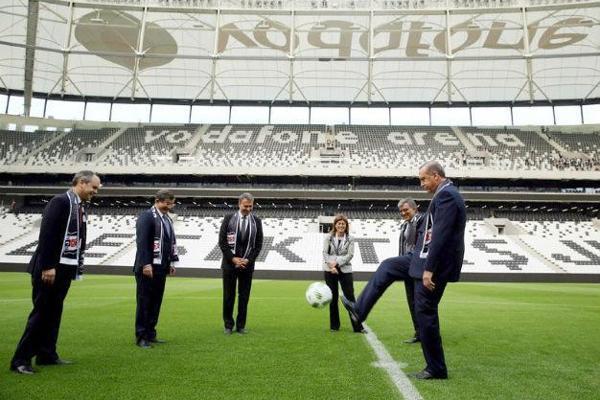New Beşiktaş stadium inaugurated amid empty tribunes
ISTANBUL


CİHAN photo
The long-awaited new Beşiktaş stadium was inaugurated in a ceremony on April 10 with the attendance of politicians at the highest level, including President Recep Tayyip Erdoğan and Prime Minister Ahmet Davutoğlu. Black eagles’ supporters, however, were denied entry to the tribunes of their new home pitch due to tight security measures.Beşiktaş is set to return to Istanbul’s Dolmabahçe neighborhood overlooking the Bosphorus as its new stadium, Vodafone Arena, was opened with an official ceremony with the attendance of Erdoğan, Davutoğlu, former President Abdullah Gül, ministers, officials from the Turkish Football Federation and the team’s management on April 10.
Erdoğan, Davutoğlu and Gül, along with Turkish Sports Minister Akif Çağatay Kılıç, national team manager Fatih Terim and Beşiktaş president Fikret Orman, entered the field and passed the football to each other.
The team’s supporters were keen to follow the ceremony and get a view of the new stadium after a 1065-day break, yet they were denied entry to the Arena even after the ceremony.
Strict security measures were taken around Dolmabahçe, where the Prime Ministry’s Istanbul offices are located. Security officials were dispatched around the stadium and guests were allowed inside the arena after going through two security checkpoints. Snipers were also placed on the stadium’s roof.
The actual opening of the stadium, with the presence of Beşiktaş supporters, is set to take place on April 11 in a football match against Bursaspor with seven weeks to go in the league.
The ruling Justice and Development Party (AKP) and Erdoğan have a thorny relationship with Beşiktaş, especially after the 2013 Gezi protests in Istanbul where members of iconic Beşiktaş supporter group Çarşı were accused of “attempting to overthrow the government.”
The Beşiktaş football club’s most famous support group is known for its left-leaning ideology and emphatic dissident stance on a panoply of topics, as well as their sensitivity to social movements. They played an important role in spreading the Gezi protests, as they were among the first groups to continue demonstrating despite a brutal police crackdown on protesters following the first raids on Gezi Park in May 2013.
Many Çarşı members were detained during the protests, as the group became a target of officials.
